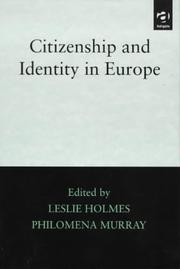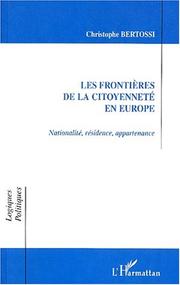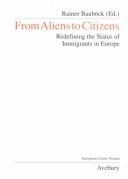| Listing 1 - 10 of 42 | << page >> |
Sort by
|
Book
ISBN: 0748671978 1281785873 9786611785871 074863343X 9780748633432 9781281785879 9780748633418 0748633413 0748633421 9780748633425 9780748671977 6611785876 Year: 2022 Publisher: Edinburgh
Abstract | Keywords | Export | Availability | Bookmark
 Loading...
Loading...Choose an application
- Reference Manager
- EndNote
- RefWorks (Direct export to RefWorks)
In the era of globalisation, European integration, mass migration, and changing patterns of political participation and welfare state provision, the precise shape and structure of citizenship in Europe seems to be altering. This book explores these developments through the analysis of a range of perspectives, uniting a theoretical orientation with an empirical approach. The central theme of the book is that the way in which we assess the impact of these changes on citizenship depends upon how we view citizenship theoretically. The text is divided into two sections. First, the book identifies t
Book
ISBN: 9781349702350 1349702358 Year: 2018 Publisher: London: Palgrave Macmillan,
Abstract | Keywords | Export | Availability | Bookmark
 Loading...
Loading...Choose an application
- Reference Manager
- EndNote
- RefWorks (Direct export to RefWorks)
This book is a study of the multiple meanings of European citizenship, which has been represented and publicly communicated by the European Commission in five distinctive ways – Homo Oeconomicus (1951-1972), A People's Europe (1973-1992), Europe of Transparency (1993-2004), Europe of Agorai (2005-2009) and Europe of Rights (2010-2014). The public communication of these five distinct representations of European citizenship reveal how the European Commission conceived of and attempted to facilitate the development of a Civil Europe. Ultimately this history, which is based upon an analysis of public communication policy papers and interviews with senior European Commission officials past and present, tells a story about changing identities and about who we as Europeans might actually be and what kind of Europe we might actually belong to.
Book
ISBN: 2130545882 9782130545880 Year: 2005 Publisher: Paris : PUF,
Abstract | Keywords | Export | Availability | Bookmark
 Loading...
Loading...Choose an application
- Reference Manager
- EndNote
- RefWorks (Direct export to RefWorks)
Citizenship --- Group identity --- Citizenship - Europe. --- Group identity - Europe.
Book
ISBN: 2724607279 9782724607277 Year: 1997 Volume: *1 Publisher: Paris Presses de Sciences Po
Abstract | Keywords | Export | Availability | Bookmark
 Loading...
Loading...Choose an application
- Reference Manager
- EndNote
- RefWorks (Direct export to RefWorks)
Citizenship --- Political rights --- European Union countries --- Citizenship - Europe. --- Political rights - Europe.
Book
ISBN: 9783515111874 3515111875 Year: 2016 Volume: 54 Publisher: Stuttgart : Franz Steiner Verlag,
Abstract | Keywords | Export | Availability | Bookmark
 Loading...
Loading...Choose an application
- Reference Manager
- EndNote
- RefWorks (Direct export to RefWorks)
In 212 CE, the emperor Caracalla extended citizenship to nearly all free-born residents of the Roman Empire. In doing so, he transformed not only his own, but the very ideal of empire and statehood in Europe. This volume first inquires into the contexts of Caracalla's act in his own day. Rome was an ancient empire : it had traditionally ruled over populations that were conceived and governed as distinct units, a practice that was both strategic and ideological. What were the practical and political effects of a universalizing ideology in this context ? Was there a reorientation of private social and legal practice in response ? And what politics of exclusion came to apply, now that citizenship no longer served to distinguish persons of higher and lower status ? The volume subsequently traces the history of citizenship in universalizing ideologies and legal practice from late antiquity to the codification of law in Europe in the nineteenth century. Caracalla's act was then repeatedly cited as the ideal toward which sovereign polities should strive, be they states or empires. Citizenship and law were thereby made preeminent among the universalisms of European statecraft.
Citizenship --- History --- Social aspects --- Political aspects --- Caracalla, --- Influence --- Constitutio Antoniniana --- Citizenship - Europe - History

ISBN: 9053569227 9786611191153 1281191159 904850158X 9789048501588 9789053569221 9781281191151 6611191151 Year: 2007 Publisher: Amsterdam : Amsterdam University Press,
Abstract | Keywords | Export | Availability | Bookmark
 Loading...
Loading...Choose an application
- Reference Manager
- EndNote
- RefWorks (Direct export to RefWorks)
Latest IMISCOE publication analyses citizenship policies in the ten new EU Member States
Citizenship -- Europe. --- Citizenship -- European Union countries. --- Citizenship. --- Citizenship --- Nationality. --- Migration policy. --- Nationalité --- Nationalité --- Citoyenneté --- European Union.
Book
ISBN: 0191948349 019267210X 0192672118 0192857584 9780192857583 9780191948343 Year: 2022 Publisher: Oxford Oxford University Press
Abstract | Keywords | Export | Availability | Bookmark
 Loading...
Loading...Choose an application
- Reference Manager
- EndNote
- RefWorks (Direct export to RefWorks)
"Initially sparked by the dramatic events of the refugee crisis, the original idea for this book took a more concrete shape in 2016 when the personal experience of the Brexit referendum pushed me to forcefully confront the transformations of citizenship. In 2017, I realized that to fully appreciate the meanings and implications of neoliberal citizenship I had to explore its 'sacred' foundations and thus reflect on my previous research on religion and secularism from a different angle. In 2018, this prompted me to engage with the concepts of resilience and sacrifice and to think of them in relation to the events that had begun to unfold ten years earlier with the Global Financial Crisis and the Eurozone crisis. It was not until 2019 though that, on a rainy summer day in Innsbruck, eventually armed with a structure and a sense of urgency, I began to write this book in a systematic fashion. When the pandemic erupted in 2020, it was immediately clear that its causes and effects would be crucially relevant for the argument I was making. Most of the book was written during the lockdowns of 2020 and 2021"--
Citizenship --- Neoliberalism --- Neoliberalism. --- Neo-liberalism --- Liberalism --- Citizenship - Europe --- Neoliberalism - Europe --- Europe. --- Political philosophy. Social philosophy --- Economic sociology --- Economic order

ISBN: 184014002X 9781840140026 Year: 1999 Publisher: Aldershot Ashgate
Abstract | Keywords | Export | Availability | Bookmark
 Loading...
Loading...Choose an application
- Reference Manager
- EndNote
- RefWorks (Direct export to RefWorks)
Political sociology --- Europe --- Group identity --- Nationalism --- Citizenship --- Political aspects --- Politics and government --- Group identity - Political aspects - Europe --- Nationalism - Europe --- Citizenship - Europe --- Europe - Politics and government - 1989 --- -Political sociology

ISBN: 2747502813 9782747502818 Year: 2001 Publisher: Paris L'Harmattan
Abstract | Keywords | Export | Availability | Bookmark
 Loading...
Loading...Choose an application
- Reference Manager
- EndNote
- RefWorks (Direct export to RefWorks)
Citizenship --- Immigrants --- Citoyenneté --- Civil rights --- Droits --- Domicile --- 342.71 --- Nationaliteit. Staatsburgerschap --- 342.71 Nationaliteit. Staatsburgerschap --- Citoyenneté --- Residence (Law) --- Conflict of laws --- Citizenship - Europe. --- Domicile - Europe.

ISBN: 1859720595 9781859720592 Year: 1994 Volume: 17 Publisher: Aldershot: Avebury,
Abstract | Keywords | Export | Availability | Bookmark
 Loading...
Loading...Choose an application
- Reference Manager
- EndNote
- RefWorks (Direct export to RefWorks)
Aliens --- Naturalization --- Citizenship --- Legal status, laws, etc. --- Europe --- Aliens - Legal status, laws, etc. - Europe --- Naturalization - Europe --- Citizenship - Europe --- IMMIGRES --- GROUPES ETHNIQUES --- EUROPE
| Listing 1 - 10 of 42 | << page >> |
Sort by
|

 Search
Search Feedback
Feedback About UniCat
About UniCat  Help
Help News
News